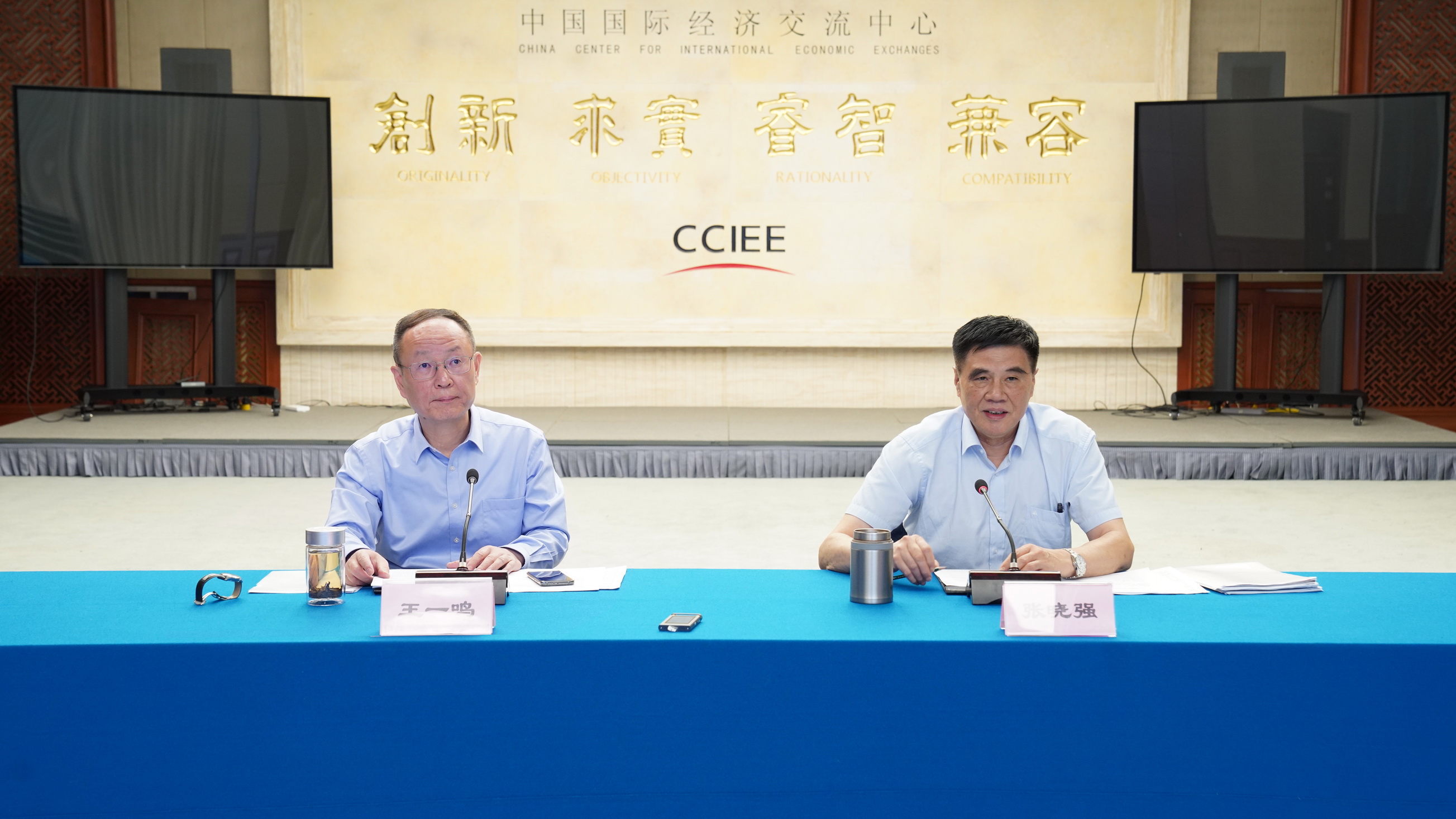Ensuring Good Cross-Cycle Adjustment of Macro Policies – CCIEE Holds the 144th “Monthly Economic Talk”
- Time:2021-10-12
- source:CCIEE
On 27 September 2021, China Center for International Economic Exchanges (CCIEE) held the 144th “Monthly Economic Talk”, which was themed on “Ensuring Good Cross-Cycle Adjustment of Macro Policies”, through virtual approach. Zhang Xiaoqiang, Executive Vice Chairman and CEO of CCIEE and Former Vice Chairman of National Development and Reform Commission (NDRC) presided over the Talk, and Zhu Guangyao (online), Vice Chairman of CCIEE and Former Vice Minister of Finance, and Wang Yiming, Vice Chairman and Chairman of Academic Committee of CCIEE and Former Vice President of Development Research Center of the State Council delivered speeches respectively.

Zhang Xiaoqiang pointed out that as the major entities, medium-sized, small and micro enterprises account for 90% of the national total, providing 80% of the jobs in urban areas. It was clearly put forward at the weekly State Council executive meeting on September 22 that macro policies should continue to be implemented with the focus on ensuring security in job, basic living needs and operations of market entities, and the healthy and sustainable development of medium-sized, small and micro enterprises should always be taken as an important task. The government should continue to improve the accuracy of credit loan policy and construction of platforms of public technology and relevant information services, and develop innovation board in stock market to provide enterprises with more favorable conditions for direct financing.
Zhu Guangyao said that the COVID-19 pandemic has severely hit the supply, transportation and storage of global supply chain. To cushion the negative impact of the pandemic, most countries all around the world have eased their currency and fiscal policies, leading to abrupt increase in fiscal deficit and debt to asset ratios among major western economies. A consensus has been commonly reached by major economies worldwide that there would be a mid-term inflation and quantitative easing of currency policies would be gradually phased out. There is also uncertainty lingering over the reform on international tax system. During the post-pandemic era, international rules for digitalization should continue to be made with more inclusiveness. As the only major economy to realize positive growth in last year, China faces the trend that the economic development in the latter half of this year will be slower than that of the first half. During the counter-cyclical adjustment, the government should adopt cross-cycle policies proactively, improve consumption and investment in fixed asset reasonably, endeavor efforts to ensuring a GDP growth rate higher than 6%, so as to secure a healthy development of economy in the future while pursuing a better performance.
Wang Yiming indicated that cross-cycle adjustment of macro policies is an effective response to increasing uncertainty in global economy, out-of-phase economic recoveries and policies between China and other major economies, and new situations and challenges like pandemic resurgences in certain areas and increased downward pressure on economy. He viewed that effective cross-cycle adjustment requires coordination of macro policies of 2021 and 2022, control of tempo and implementation of the adjustment and improvement in policy accuracy and effectiveness. The government should take various measures to stabilize the consumer prices and continue to secure the supply of stock commodities. Possible spillover effect of the Federal Reserve’s policy should be cautiously prevented to maintain a basically reasonable and balanced exchange rate of RMB, with supervision and forecasting of cross-border capital flow strengthened. In pursuit of balance between growth and risk prevention, the government should mitigate debts of local governments, steadily and orderly resolve debt risks of certain major real estate companies, continue to enhance ability of large, medium-sized and small financial institutions to respond to risks and improve financial system’s resistance to risks.
After the speeches, experts present interacted and communicated with the media. Some research fellows of CCIEE and audience from member organizations of CCIEE, research institutes, enterprises and the media took part in the Talk through virtual approach.
